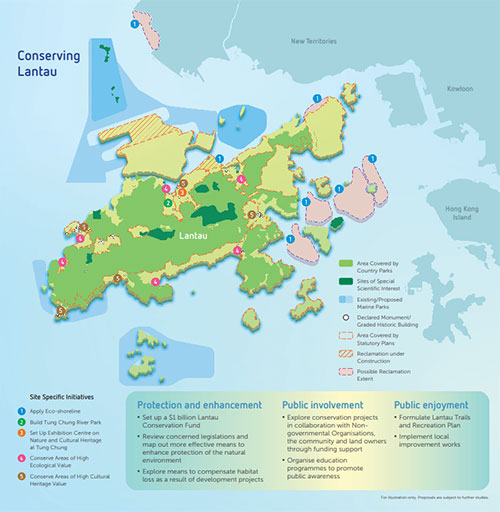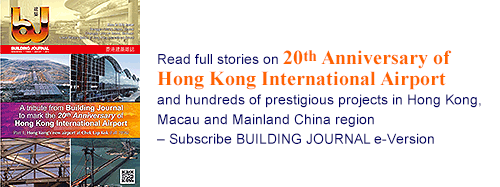|
|||
| HONG KONG | <Search <Archives <eBulletin | ||
October 15, 2018 The Lantau Tomorrow Vision The following is part of the speech, focusing on land development, by the Chief Executive in delivering “The Chief Executive’s 2018 Policy Address” to the Legislative Council on October 10.
The Task Force on Land Supply (Task Force) set up in September last year has shouldered the task of forging collaborative deliberation with the public, in an attempt to build the greatest consensus in society. The full commitment and hard work of all members are highly respectable. Half a month ago, upon my request, the Task Force shared with me its preliminary key observations. While public attention has centred on observations in respect of individual land supply options, I am attracted to the Task Force’s three general observations that the community broadly agrees that land supply is pressing; that we should be prepared for the rainy days; and that a multi-pronged approach should be adopted.
In the Policy Address, I present some plans on land supply in line with such policy objectives. They include Lantau Tomorrow Vision, development of brownfield sites, land sharing and revitalisation of industrial buildings. As regards the further analysis of individual options, I will give detailed consideration to the Task Force’s recommendations in its full report to be submitted by the end of this year. Lantau, the largest outlying island in Hong Kong, is home to the Hong Kong International Airport and the gateway to the world. With the commissioning of the Hong Kong-Zhuhai-Macao Bridge, the transport connectivity between Hong Kong and other cities in the Greater Bay Area will be further improved, making Lantau a “Double Gateway” to the world and other Greater Bay Area cities. The Government’s vision for the development of Lantau covers the development areas at artificial islands with a total area of about 1,700 hectares near Kau Yi Chau and Hei Ling Chau in the Central Waters, North Lantau as well as the coastal areas of Tuen Mun, including the River Trade Terminal after re-planning and Lung Kwu Tan, to be supported by a new set of transport networks connecting various development areas. The vision aims to instil hope among Hong Kong people for economic progress, improve people’s livelihood and meet their housing and career aspirations. The vision of providing 260 000 to 400 000 residential units, with 70% being public housing, and accommodating 700 000 to 1 100 000 people, and creating 340 000 jobs for the coming 20 to 30 years will be realised through five policy directions. They are: increasing land supply, according priority to transport infrastructure, promoting economic development, enhancing environmental capacity and increasing leisure and entertainment facilities. And we will make investment to achieve this vision. The Lantau Tomorrow Vision involves the overall planning of the city and implementation of a number of major infrastructure projects in the coming decades, and requires the efforts of various bureaux, government departments and Non-Governmental Organisations (NGOs), which entails a large amount of meticulous co-ordination work. As the Lantau Tomorrow Vision is a priority area of the current-term Government, I will set up as soon as possible a dedicated co-ordination office, which is directly accountable to me, to steer the overall direction as well as co-ordinate and monitor the planning and implementation of the programme. This office will be expanded as needed to ensure that the policy and implementation could be effectively matched. The Lantau Tomorrow Vision is a long-term planning. In order to address our pressing housing problem, we will speed up the studies on brownfield sites in the New Territories and make necessary arrangements for reprovisioning existing operations to facilitate housing development. We also propose introducing the Land Sharing Pilot Scheme so that private land not covered by Government’s planned development may be better utilised through a fair and highly transparent mechanism to meet the needs of both public and private housing in the short to medium term. To dispel public worries, not less than 60% to 70% of the increase in floor areas shared between the Government and applicants must be used for public housing development mainly SSFs. We will also reactivate the revitalisation scheme for industrial buildings and in order to address the imminent housing problem, allow for the first time wholesale conversion of industrial buildings for transitional housing. Furthermore, we will support the Hong Kong Housing Society (HKHS) to redevelop its aged rental estates, invite the URA to launch the redevelopment of buildings under the Civil Servants’ Co-operative Building Society Scheme, and support the Settlers Housing Corporation Ltd in taking forward the redevelopment project of Tai Hang Sai Estate. By so doing, we will meet the long aspirations of the owners and residents concerned and also increase housing supply. To make efficient use of public housing resources, the HKHA will, in light of the operational experience of the HKHS’s pilot scheme, join the scheme and allow owners of HKHA’s SSFs with premium unpaid to sublet their flats to needy families. The HKHA will also introduce a new initiative whereby under-occupation households whose family members are all aged 70 or above are allowed to enjoy lifetime full rent exemption upon their transfer to small, new or refurbished units. Furthermore, the Government will accept the HKHS’s recommendation to introduce a “Flat for Flat Pilot Scheme for Elderly Owners” for its SSFs with premium not yet paid. Under this scheme, owners aged 60 or above who have owned their flats for at least ten years can sell their original flats and then buy a smaller SSF flat in the secondary market without payment of premium.  <Enlarge> (Photo: CEDD) Online and Offline year round advertising package from
HK$2,300 per month <click here> for details
 |
|||||||||||||||
|


